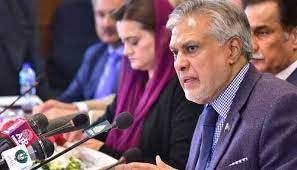ISLAMABAD - Finance Minister Ishaq Dar on Monday rejected the impression that he was responsible for not finalizing the International Monetary Fund (IMF) deal by asking ‘whether Pakistan has defaulted or not’.
“Has Pakistan defaulted?” Pakistan has made all payments on time,” the finance minister responded to the media when a journalist asked him whether the inability to finalize the agreement with the IMF was his failure.
He, however, avoided answering any questions about the IMF and the upcoming budget.
Earlier, addressing the inaugural session of the International Conference on Islamic Capital Market, the finance minister re-affirmed the government’s resolve to promote Islamic finance industry and eliminate interest-based systems in Pakistan.
He said that we are committed to achieve the goal of this transformation within the timeframe of five years given by the Federal Shariat Court. The size of Islamic Finance Industry in Pakistan is estimated to have surpassed forty two billion dollars last year and assets and deposits stand at Rs7.2 trillion and Rs5.2 trillion respectively. He said assets of Islamic banking industry posted year on year growth of 29 percent in the fiscal year 2022. He said the network of Islamic banking industry consists of 22 Islamic banking institutions, of these six are full-fledged Islamic banks and sixteen conventional banks having stand-alone Islamic banking branches.
The Finance Minister announced that the National Savings have been directed to launch Shariat compliant products for investors. He said the products shall cater to the persistent public demand for safe investments in line with the principles of Shariat. He said the products will be in the forms of saving accounts and term accounts of one, three and five years.
Ishaq Dar said the Finance Division has constituted a steering committee for providing strategic guidelines regarding implementation of Federal Shariat Court’s judgment on Riba.
“Pakistan has a strategic plan in place to grow Islamic finance”, he said adding, “We have a financial inclusion strategy that covers all the components needed to create Islamic financing”.
In his speech, SBP Governor Jameel Ahmed said, “We are committed to transforming the financial sector into a Shariah-compliant system. To this end, SBP and SECP, as part of the federal government’s steering committee, are playing their roles in achieving the aligned goals for the transformation towards an Islamic economic system”.
He added that the main impediments to the growth of Islamic capital markets include gaps in institutional, legal, and regulatory frameworks; a lack of efficient ways for price formation and discovery; and a lack of diversity in Islamic capital markets instruments and investors.
He noted that the aim is to eliminate interest from the country’s economy by 2027. “In the past decade the country has seen a 24% rise/growth in Islamic banking, with the Islamic capital market growing to around $3 trillion,” he said.
He added, this has reflected positively in the overall state of the country’s economy. “Islamic banking now makes up 20% of the banking sector in Pakistan.” He said that Pakistan has issued Sukuk bonds (Shariah-compliant bonds) worth Rs2.8 trillion. A committee has been formed within the SBP to convert government debt into Sukuk, he informed.






